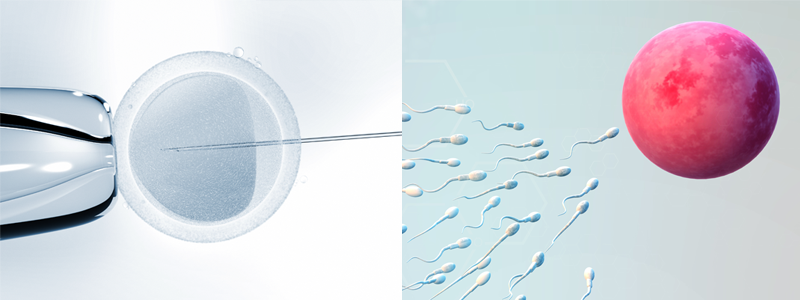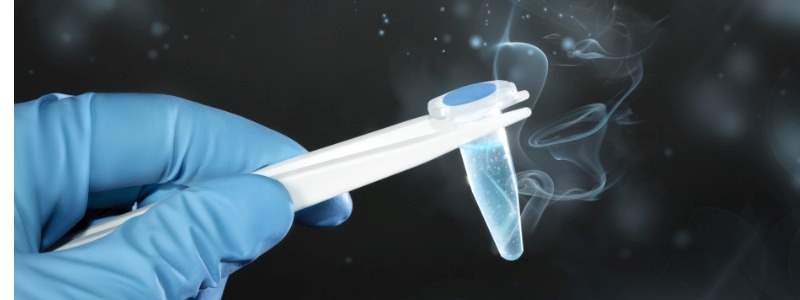There are many different factors that can affect your ability to conceive. If you are having difficulties, then understanding the problem is the first step in finding a solution. If you and your partner have been diagnosed with PCOS and low sperm motility, then this is not a reason to panic. There are many other couples like you, and many options available to you.
In fact, around 20% of women have a form of polycystic ovary syndrome (PCOS), and, as reported by HFEA, ‘around half of couples who are having problems conceiving, the cause of infertility is sperm-related’.
What is PCOS and what does it mean for fertility?
PCOS is a common condition that affects a woman’s ovaries. When a woman has PCOS, it means that she has a large number of harmless ovarian cysts that have undergone “follicular arrest”.
In a normal ovary, an egg develops within - and is released from - a follicle. Yet in women with PCOS many follicles are underdeveloped, meaning an egg cannot be released, and so ovulation cannot take place. This presents the woman with a hormone inbalance which, among other symptoms, can cause irregular menstrual cycles and difficulties in conceiving.
‘Women with medical conditions such as PCOS (polycystic ovary syndrome) can be given expert information to improve ovulation and help natural conception. Testing gives people the knowledge and the power to understand their situation and make decisions for the future that are based on scientifically reliable results.’ Dr Geeta Nargund, Medical Director at CREATE, in Huffington Post
You can read more about PCOS here.
The good news is that women with PCOS generally respond well to IVF treatment. In fact the greatest problem with these patients is that they can respond too well to stimulation, which puts them at risk of Ovarian Hyperstimulation Syndrome (OHSS). At CREATE many PCOS patients are treated with our Mild Stimulation protocols, which include 5-9 days worth of stimulating drugs rather than the 4-5 weeks worth used in conventional IVF. This approach has the benefit of largely avoiding the severest risks of OHSS and in addition, this lighter regimen also has the added advantage of leaving the body less stressed and hopefully more receptive to implantation.
What is low sperm count and what does it mean for fertility?
Low sperm count means semen contains fewer sperm than normal, and so the chances of conception are lower during intercourse. However, male factor infertility is not solely a result of a low number of sperm; there may also be issues with morphology and/or a blockages that prevent the delivery of sperm.
What’s more, despite being a contributor in 50% of infertility problems (and the sole cause in around 30% of cases) male infertility is often overlooked or overshadowed by conversations surrounding female infertility. A shocking truth considering male sperm counts have dropped by as much as 50% in the last 40 years.
How is low sperm count identified?
- Less than 15 million sperm per ml of semen qualifies for low sperm count
- Less than 1 million/ml of semen qualifies for very low sperm count
- Sperm motility (the movement and swimming of sperm) of less than 32% efficiency is considered low
- Semen which qualifies for 97% or above abnormal sperm morphology (identified, when semen is viewed under a microscope, by head or tail defects) are considered as low sperm count
Click here for more information about male infertility.
My husband has low sperm motility & I have PCOS: what are my options?
It’s uncommon to have both conditions, but it’s not unheard of. There are many options available to you if your partner has low sperm motility and you have PCOS, including:
- Mild IVF
- Natural IVF
- Intrauterine insemination (IUI)
- Intracytoplasmic sperm injection (ICSI)
- Fertility treatment with sperm donation
Please get in contact to find out more about the best treatment for you.
What’s the difference between IVF and ICSI?
ICSI is a laboratory technique whereby a single sperm is directly injected into the egg. In IVF, the egg and multiple sperm are left in the dish to spontaneously fertilise . You can read more about it here.
How can IVF provide a solution to your fertility problems?
There have been many cases of IVF success with patients suffering from PCOS and low sperm count. This is because IVF enables a man and a woman to maximise their chances of a sperm and egg fertilising, and takes your specific circumstances into account.
For instance, Mild IVF works alongside a woman’s natural cycle and uses lower doses of fertility drugs in order to collect 6-10 high quality eggs. Less drugs and a focus on quality over quantity means that women with a normal egg reserve, PCOS or endometriosis are suitable for mild IVF as this treatment reduces the risk of OHSS that high stimulation treatments can lead to.
If you are curious about or interested in the fertility treatments that CREATE Fertility offers, please get in contact with the friendly team today. You can also book a fertility consultation, where our expert consultants will provide you and your partner with a tailored fertility treatment review and plan.






